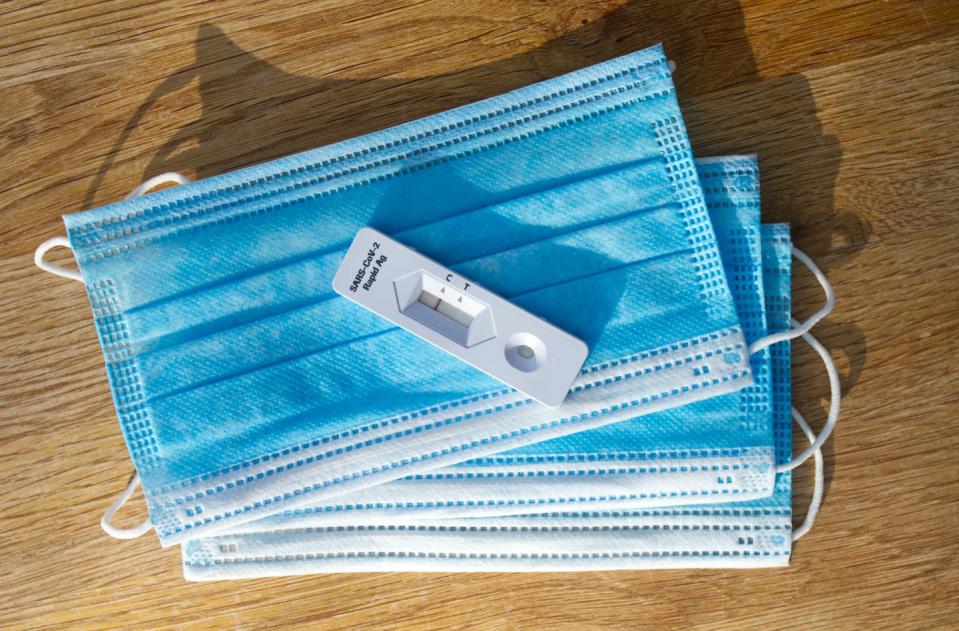My RATs are negative but I still think I might have COVID. Should I get a PCR test?

You’ve been exposed to COVID and are starting to get symptoms. But after a couple of days of testing with rapid antigen tests (RATs), your tests remain negative.
Mass PCR testing has been scaled back, so in what situations can you get a PCR? And why might it be useful?
Read more: Someone in my house has COVID. How likely am I to catch it?
RATs are less sensitive for current variants
PCR tests are more sensitive than RATs. They detect viral RNA and don’t require high levels of virus, meaning it can detect disease early. PCRs are accurate approximately 95% of the time.
In contrast, a RAT can only detect the viral proteins present in the sample. So it’s less sensitive and requires more virus, which is likely to accumulate later in the disease process, before it provides a positive result.
RATs accurately detected around 81% of positive cases in earlier variants such as Delta. However estimates for Omicron are lower and aren’t consistent between studies, varying from around 55% (without symptoms) to 73% (with symptoms) on average. Results vary depending on the stage of infection, degree of symptoms, and the individual kit used, among other things.
We are still awaiting the Therapeutic Goods Administration’s independent review of RAT kits for the new Omicron sub-variants, however, the limited evidence suggests RATs may be less effective against these new variants.
The United States Food and Drug Administration recently advised performing repeat testing over consecutive days to reduce the risk of an infection being missed (known as a false negative).
An infected person will test positive on a PCR test one to two days before a RAT. It can take a few days after symptoms show for the RAT to become positive.
Why have PCR testing sites shut down?
Throughout Australia, the number of PCR testing facilities have been reduced significantly since mid-year.
One reason is that PCR tests are an expensive service for the government to conduct (each test costs around A$70) and the operation of the testing centres requires staff to be redeployed from other roles. This requires large amounts of backfill and reshuffling.
Today, RATs are generally health authorities’ preferred testing approach.
Read more: How should we manage COVID without rules? Keep testing and stay home when positive
So who is eligible for a PCR?
Below are the current guidelines for using RATs versus PCR for each state – and the advice for what to do if you test positive or have COVID symptoms. Click the grey plus (+) on your state or territory to learn more.
In some states, PCRs are prioritised for people with a higher risk of severe illness.
If your RATs keep coming up negative, and you are experiencing symptoms, you can request a PCR from your GP.
However, according to the National Coronavirus Hotline, if you visit a testing site that is still up and running and specifically ask for a PCR, you will generally receive one.
You can find testing centres that are still active using this tool.
Read more: It’s after-hours and I need to see a doctor. What are my options?
Why is an accurate COVID test important?
Knowing you’re COVID positive is important for many reasons. It allows you isolate and avoid spreading illness to loved ones and those most vulnerable. You can also alert any close contacts.
If you happen to get very sick, it allows you to be considered for COVID medications and for your health providers to monitor the long-term effects of COVID such as blood clots, neurological side-effects and other long-term complications.

You could also be eligible for COVID antiviral treatments, which aim to prevent people who are at greater risk of severe disease from becoming very ill with COVID. These are only available on prescription from a doctor or nurse practitioner and are most effective when started within five days of your symptoms appearing.
Getting an accurate result is especially important if you are living, working or entering high-risk settings such as those with vulnerable populations, age care and health care.
Read more: Tested positive to COVID? Go easy on yourself – try not to rush back to work or exercise
This article is republished from The Conversation is the world's leading publisher of research-based news and analysis. A unique collaboration between academics and journalists. It was written by: Sathana Dushyanthen, The University of Melbourne.
Read more:
We were told to ‘stay home’ to stop COVID. Then our homes became disease hotspots
Inflation, COVID, inequality: new report shows Australia’s social cohesion is at crossroads
Sathana Dushyanthen does not work for, consult, own shares in or receive funding from any company or organisation that would benefit from this article, and has disclosed no relevant affiliations beyond their academic appointment.

 Yahoo Finance
Yahoo Finance 